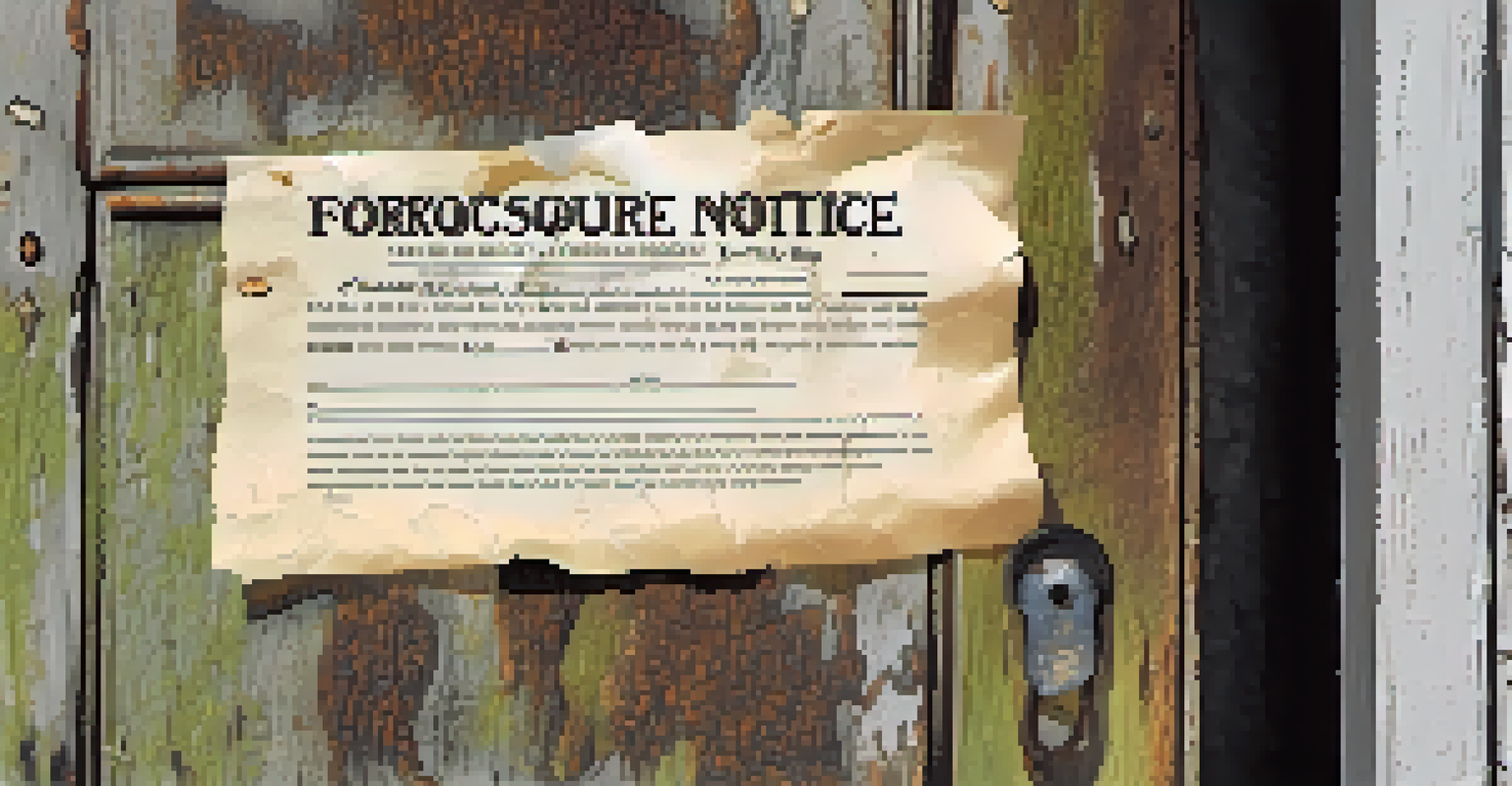Understanding the Impact of Foreclosures on Valuation

What Are Foreclosures and Their Basic Mechanics?
Foreclosures occur when a homeowner fails to make mortgage payments, leading the lender to reclaim the property. This process often starts with a notice of default, followed by various legal proceedings. Ultimately, if the homeowner cannot rectify the situation, the property is auctioned off or taken back by the bank, which can significantly alter its market value.
In real estate, the three most important factors are location, location, location.
Understanding the foreclosure process is crucial for buyers and investors alike. When a property is foreclosed, it typically means that the homeowner is in financial distress, and the property may be sold at a lower price. This can create opportunities for savvy investors looking for bargains, but it also impacts surrounding property values.
For example, when multiple homes in a neighborhood are foreclosed, it can lead to a drop in overall property values, as potential buyers may perceive the area as less desirable. This ripple effect can linger, affecting both current homeowners and prospective buyers.
How Foreclosures Impact Local Real Estate Markets
Foreclosures can create a wave of change in local real estate markets. When a bank lists a foreclosed property for sale, it often prices it below market value to quickly recoup losses. This can lead to a domino effect, where neighboring homes also reduce their prices to remain competitive, ultimately affecting the entire neighborhood’s valuation.

Moreover, a high number of foreclosures can signal economic instability in an area, making potential buyers hesitant. For instance, if a community is known for a high foreclosure rate, it might deter new families from moving in, further stymying market recovery. This hesitance can perpetuate lower property values and deter investment.
Foreclosures Lower Property Values
An increase in foreclosures typically leads to a decrease in overall property values in the affected area.
In contrast, a market with low foreclosure rates often sees rising property values, as confidence in the area remains high. Buyers are more willing to invest when they believe that their property will appreciate over time, creating a positive cycle for the local market.
The Relationship Between Foreclosures and Property Values
Foreclosures and property values have a complex relationship that can fluctuate based on various factors. Typically, an increase in foreclosures correlates with a decrease in property values, as the influx of low-priced homes can saturate the market. This situation often leads to buyers feeling like they have bargaining power, further driving prices down.
The best investment on Earth is earth.
However, while foreclosures can depress property values in the short term, they can also present opportunities for recovery. Once a market stabilizes and foreclosures decrease, we often see a rebound in property values as buyers return and inventory becomes scarcer.
An example of this can be seen in the aftermath of the 2008 financial crisis. Many areas experienced significant drops in property values due to foreclosures, but as the economy improved, those same areas began to see revitalization, leading to increased demand and rising home prices.
The Role of Investors in Foreclosure Markets
Investors play a pivotal role in the foreclosure market, often purchasing distressed properties at a fraction of their market value. By doing so, they can renovate and sell or rent these homes, effectively revitalizing the neighborhood and contributing to price stabilization. This infusion of capital can help mitigate the negative impacts of foreclosures on surrounding properties.
However, the presence of investors can also lead to concerns about gentrification, where rising property values may displace long-term residents. This scenario, while beneficial in terms of overall market health, can create tension within communities as the demographic landscape shifts.
Investors Revitalize Foreclosure Areas
Investors can purchase distressed properties to renovate and rent or sell, helping stabilize property values in neighborhoods.
For instance, a neighborhood that was once affordable may see new developments and rising rents, making it less accessible for original residents. Thus, while investors can help recover property values, their actions must be balanced with community needs to ensure sustainable growth.
The Impact of Government Policies on Foreclosures
Government policies play a crucial role in shaping the landscape of foreclosures and their impact on property valuation. Programs aimed at preventing foreclosures, such as loan modifications and assistance for struggling homeowners, can help stabilize the housing market. By keeping families in their homes, these initiatives can reduce the number of foreclosures and mitigate price declines.
Conversely, lax regulations or failure to enforce existing laws can lead to an increase in foreclosures, causing property values to plummet. For example, during the housing crisis, some areas saw a lack of oversight, allowing predatory lending practices to flourish, which ultimately led to widespread foreclosures.
Thus, active governmental involvement can create a buffer against the negative effects of foreclosure spikes. Policies that promote responsible lending and provide homeowner assistance can help maintain property values and community integrity.
How to Navigate a Market with High Foreclosure Rates
Navigating a market with high foreclosure rates can seem daunting, but it can also present unique opportunities. Buyers should conduct thorough research on the area, considering not only the immediate pricing but also the long-term potential for appreciation. Understanding the local market dynamics can help buyers make informed decisions.
Additionally, working with a knowledgeable real estate agent can provide valuable insights into properties that may have been overlooked or undervalued. Agents can guide buyers through the complexities of purchasing foreclosures and help negotiate favorable terms.
Government Policies Matter
Effective government programs can help prevent foreclosures, thereby maintaining property values and community integrity.
For example, a buyer could explore properties that have been on the market for an extended period, as these may be ripe for negotiation. By being strategic and patient, buyers can find hidden gems in a foreclosure-heavy market, ultimately leading to a rewarding investment.
The Future of Foreclosures and Property Valuation Trends
As the real estate market continues to evolve, understanding the future of foreclosures and property valuation is crucial. Economic indicators, such as interest rates and job growth, will play a significant role in shaping the landscape. A strong economy typically correlates with lower foreclosure rates, while economic downturns can trigger spikes in foreclosures and subsequent valuation drops.
Moreover, advancements in technology and data analytics are providing investors and buyers with more tools to assess market conditions. These developments allow for more accurate predictions regarding property values and foreclosure trends, enabling smarter investment decisions.

Ultimately, staying informed and adaptable will be key in navigating the ever-changing real estate landscape. By understanding how foreclosures affect property values today, stakeholders can better prepare for the challenges and opportunities that lie ahead.